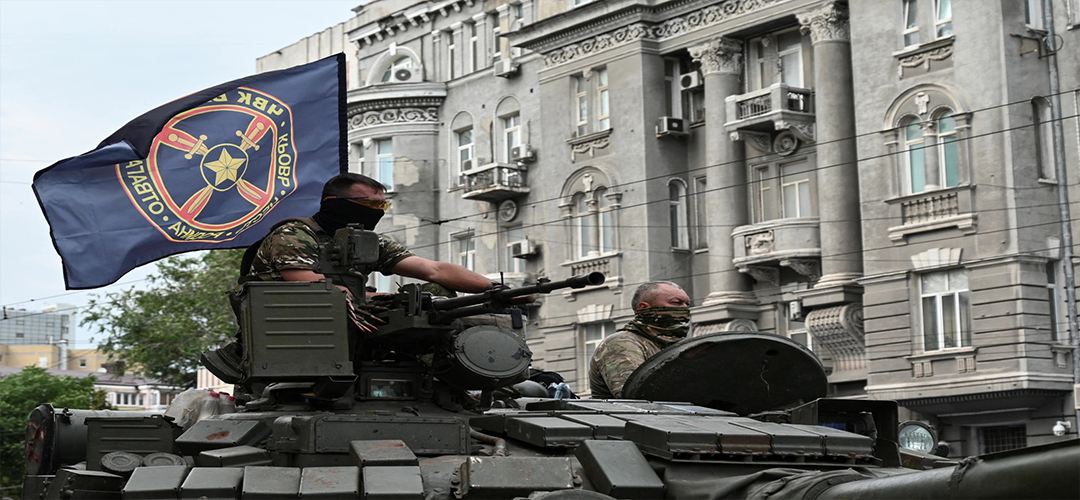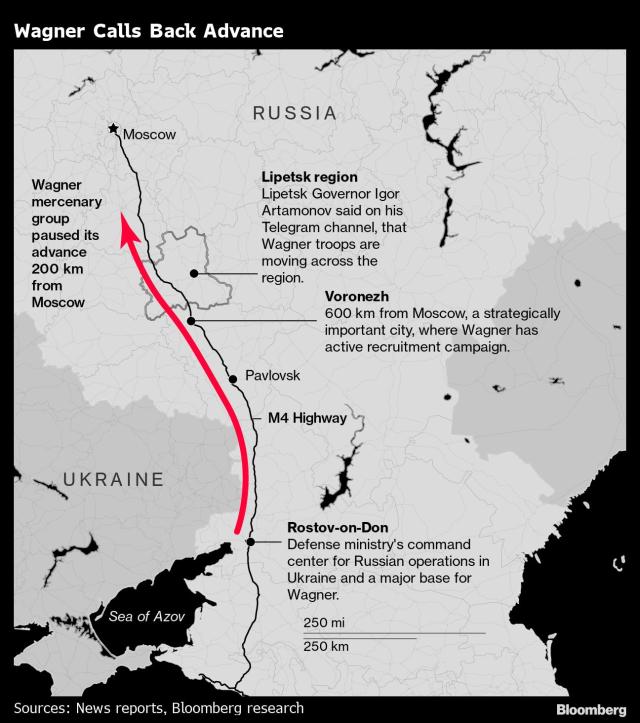A Tiger by the Tail
July 1, 2023 | Expert Insights

Carl Von Clausewitz aptly defined the nature of war when he called it the "continuation of politics by other means." Thus, by any definition, it is serious business in which sovereign states are involved and conduct it through state organs-organised, controlled and financed by the state. The moment the state relinquishes this control to non-state entities, now called "private military contractors (PMCs)", it runs the considerable risk of jeopardising the writ of the state on the turn of events. Nothing could have described the potential of such an enterprise getting out of control and striking the hand that feeds it more than the so-called Wagner mutiny we recently witnessed on global television.
Now many Russian security experts ruefully rub their hands and ask themselves, "How did this come to pass?"
Background
Not so long back, Prigozin, also called "Putin's Chef" by the Western media, was a national hero in the Russian Federation, felicitated by the rich and powerful with almost unrestricted access to the sanctum sanctorum of the Kremlin. Now overnight, the situation has turned on its head as an embarrassed and disconcerted Kremlin tries very hard to put the genie back into the bottle.
The shadow of 'Wagner" has hung over many war zones in Africa and the Middle East in the past few years but reached its high-water mark (and subsequently its nadir!) in Russia's special military operation in Ukraine. Mr Prigozin dominated the news, both on mainstream media and social media, as the troubleshooter on the battlefield, claiming victories in strategic strongholds like Bahumuk. However, the situation has turned around so swiftly that it left even Kremlin gasping, although the West now claims that its intelligence agencies had seen the breakup coming.

Analysis
Contrary to common perception, Wagner is no single entity but a network of companies and private military contractors linked by overlapping ownerships and logistic networks, all controlled by Moscow. Mr Putin publicly acknowledged in an address to his people that billions have been spent on the PMC from state funds.
Wagner can justifiably claim some remarkable success. It spearheaded the Russian deployment in Syria and was in the thick of the offensive backing the Assad regime that subdued the civil conflict. They drove the insurgents back in the Central African Republic alongside government forces. Due to this, numerous other African nations, like Mali, where French troops just withdrew after a decade of futilely battling terrorists, turned to Russia for assistance, regaining some of the lost Cold War influence in the continent. However, not all Wagner's endeavours were fruitful. After suffering significant setbacks in the battle against jihadists, they withdrew from Mozambique in 2019. Wagner lost the civil war in Libya, where they fought alongside the rebel General Khalifa Haftar.
Now banished to Belarus and placed under the direct supervision of its autocratic ruler Alexander Grigoryevich Lukashenko (in power since 1994, making him the longest-serving European strongman), the future of Wagner Group appears uncertain. While publicly, Kremlin is adopting no legal recourse against its operatives and Mr Prigozin, who have been offered service in the regular Russian Army by signing a contract, Mr Putin is known to nurture grudges and never allow a political opponent to escape unscathed. So, more drama could be in store for those who closely follow the fortunes of the Wagner group and its high-profile and mercurial leader.
Many in Russia and abroad were surprised and perplexed at the tolerance displayed by Mr Putin, who is not known for harbouring such sentiments for enemies of the state. But if it was a tactical move to diffuse a difficult confrontation, then it worked brilliantly. The real tough decisions will now follow, and these will in camera. For a moment, there were speculations (and hopes) of a palace coup in Kremlin, but these were quickly scorched as the entire Russian security apparatus queued behind Mr Putin to demonstrate their support. There is little political opposition surviving in Russia today that could have exploited the situation, and the Russian streets remained peaceful, albeit with a marked degree of unease. Yes, the aura of invincibility that Mr Putin enjoyed has received a dent or two, but there is no immediate threat to his continuation in power.
As regards the future of Mr Prigozhin, it is unlikely that there will be many who will bet on him regaining his earlier position in the power dynamics of Russia. If he escapes with his life to some lonely yet comfortable exile, it would be a win-win for him. At the height of the crisis, commentators were hinting at his contacts within the Russian Federal Security establishment, especially the Federal Protective Service that guards Mr Putin, but these failed to materialise.
Like any other crisis, it comes with opportunities for some. The Chechen strongman Ramzan Kadyrov (blacklisted from multiple countries and sanctioned by the U.S. State Department for violations of human rights, as well as by the European Union, the United Kingdom and several other countries) promptly volunteered to fill in the defences vacated by Wagner troops in Bakhmut, Donetsk Oblast. Similarly, President Lukashenko has claimed that it was he who convinced Mr Putin not to ‘neutralise’ Prigozhin and suggested the face-saving solution of diverting the mutineers to his own country, thus emphasising his importance to Russia. Mr Putin has publicly thanked him for his mediation.
Assessment
- Western adversaries of Russia were quick to claim that the 'mutiny' showed the widening 'cracks' in the edifice of the Kremlin power structure propping up Mr Puin. However, these cracks have failed to materialise credibly.
- By all accounts, it seems Mr Putin has overcome the crisis and may have learnt a lesson or two in dealing with armed groups outside state control.
- The West smugly gloated on the discomfort of the Kremlin's top hierarchy as their vaunted PMC disintegrated, sinking billions of dollars worth of investment and placing their foreign military expedition at risk. However, they need to revisit their dependency on PMCs, which grew to a significant size and importance during the American military adventurers in Iraq and Afghanistan.








Comments